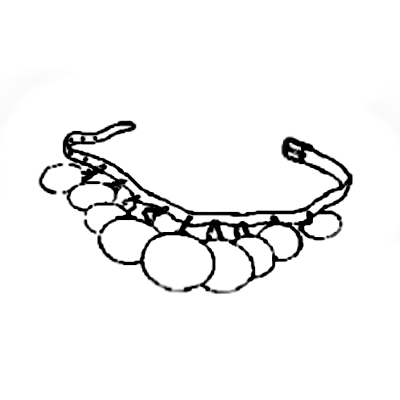tongjing overview
 Toli [Toli], Chinese translated as "bronze mirror". The so-called "mirror" of the bronze mirror is not the mirror used in ancient times, but refers to the disc-shaped bronze utensils hanging on the shaman's body that twist and make a "jing dong" sound, or are lifted and danced in the hand. Its function is similar to that of Xisha, and it is used for "suppressing demons and exorcising evil spirits".
Toli [Toli], Chinese translated as "bronze mirror". The so-called "mirror" of the bronze mirror is not the mirror used in ancient times, but refers to the disc-shaped bronze utensils hanging on the shaman's body that twist and make a "jing dong" sound, or are lifted and danced in the hand. Its function is similar to that of Xisha, and it is used for "suppressing demons and exorcising evil spirits".In the vision of Manchu shamans, Toli is often a symbol of those celestial bodies that can emit light, such as the sun, moon, and stars. Wearing it on the front and back of the shaman, it is said to "hold the sun and the moon", which plays the role of warding off evil spirits and illuminating demons; hanging on the waist, it is said to be "the sun and the moon phase ring", whichever is the meaning of the sun and the moon chasing and reflecting each other. . Toli's divine power is firmly believed by shamans. Therefore, some "great gods" have to use Toli. For example, the "Zipba Muni" sacrificed by Jilin Shi's surname is a "hand holding two large tooli," The "big hero" who dances fast.
Toli has two styles: one is a patterned "flower mirror", and the other is a smooth and non-patterned "plain mirror". The size of the bronze mirrors varies, "the small ones are 3 cm and 5 cm in diameter, the medium ones are 10 to 15 cm in diameter, and the large ones are more than 20 cm in diameter". At present, it is difficult to find such Manchu shamans using tori in field work. However, in the Mongolian shamans of the Horqin grassland, there are still people who use this kind of support force. They tied several bronze mirrors stacked in order of different sizes around their waists, and they collided with each other when they swayed;
- Pinyin:Tóng jìng
- foreign name:Toli
reference materials and contributors
- 铜镜 (满族乐器) · 百度百科
overview of other similar instruments
- sanyanxiao overview
- Daguangxian overview
- Leiqin overview
- hahao overview
- yandundagu overview
- Han Xiaozheng overview
- Fang Xiang overview
- guanzi overview
- zhuqin (Dao Qin) overview
- zhuiqin overview
- bangzi overview
- three-stringed piano overview
- Gehu overview
- xiao overview
- xiaokonghou overview
- Konghou overview
- Sheng overview
- suona overview
- hulusi overview
- gushao overview
 渝公网安备 50010702504639号
渝公网安备 50010702504639号